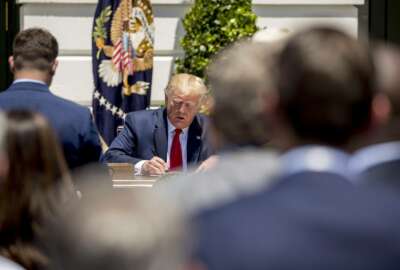
Unions push appeals court to reject immediate implementation of the Trump’s workforce executive orders
Federal employee unions last week asked the U.S. Court of Appeals to deny the government an opportunity to immediately enforce the provisions of the President's...
Federal employee unions are pushing back against the Trump administration’s argument that the U.S. Court of Appeals should immediately allow agencies to enforce the provisions of the president’s three workforce executive orders.
A group of federal employee unions, which includes the American Federation of Government Employees and the National Treasury Employees Union, on Friday afternoon filed a formal opposition to the appellants’ motion to lift the injunction on the EOs.
The administration hasn’t showed that allowing the injunction to continue presents any “unusual” impact on the public, military or national security, the unions argued.
“The government has not met this court’s ‘good cause’ standard for issuing the mandate in advance of the court’s normal timetable,” the unions wrote in their opposition. “The government has shown neither a compelling reason for deviating from this process, nor has it established why the public has any unusual interest in prompt disposition of this matter.”
U.S. attorneys had asked the U.S. Court of Appeals for the District of Columbia Circuit last month to immediately lift the injunction on the president’s workforce executive orders, after a three-judge panel overturned the August 2018 decision from a federal district court.
Related Stories
The appeals court dismissed the 2018 decision because, as the three judges argued, the lower court lacked jurisdiction in ruling on an initial legal challenge from a group of more than a dozen federal employee unions.
But the appeals court hadn’t formally lifted the injunction on the workforce executive orders, meaning agencies couldn’t begin to implement the terms of the EOs.
The initial ruling appeared to give federal employee unions some time to challenge the decision from the three-judge panel, which AFGE, NTEU and other plaintiffs on the case have said they will do.
Plaintiffs generally have 45 days to issue a petition for a rehearing or petition to review by a full appellate panel.
But government attorneys argued the court’s delay in lifting the injunction on the workforce executive orders had an immediate impact on collective bargaining negotiations underway at the Office of Personnel Management and departments of Veterans Affairs, and Housing and Urban Development, among other agencies.
Federal employee unions disagreed. The appeals court’s decision simply maintains the status quo that agencies and employee unions had experienced up until the president signed the three workforce executive orders last May.
The EOs were in affect for roughly two months.
“The district court’s injunction simply maintains the status quo put into effect by Congress in 1978 through its statutory collective bargaining scheme,” the unions wrote in their recent opposition. “There is no harm, irreparable or otherwise, from keeping that 40-year status quo in place while the normal appellate process plays out.”
Unions also argued the administration’s recent argument to more quickly lift the injunction on the workforce executive orders contradicts with the government’s initial defense of the EOs — and the urgency with which it appealed the federal district court’s initial ruling.
“The government cannot show injury when it has previously represented that the executive orders do not substantially affect current collective bargaining agreements and will result in only a ‘gradual’ change in the federal sector,” the unions continued. “If the executive orders are, according to the government, so modest then continuing the injunction of such modest changes cannot result in any serious harm.”
The Trump administration said the continued injunction on the workforce EOs would stall current collective bargaining negotiations and would prohibit agencies from, for example, negotiating with employee unions and reaching a resolution more quickly.
But if the appeals court moves forward and lifts the injunction on the executive orders, unions argue they’ll be subject to more hardship and lengthy disagreements with agencies — particularly if they’re expected to bring specific challenges with individual collective bargaining negotiations to the Federal Labor Relations Authority.
The Trump administration has argued the FLRA is the entity that should receive and handle unions’ specific complaints about the individual application and enforcement of the workforce executive orders. Unions, however, have subsequently claimed their arguments broadly challenge the executive orders as a whole.
“The government itself acknowledges that the result of the executive orders, if allowed to go into effect, will be multiple piecemeal disputes before the FLRA,” the unions wrote. “And even more chaos will ensue if the court issues the mandate, only to put the injunction back in place later if the unions prevail on their rehearing petition.”
Unions haven’t officially requested a rehearing on this particular case, but at least one organization has suggested that it will. The unions’ official opposition also suggests they will petition for a rehearing.
“[The] rehearing petition will show that the panel’s jurisdictional ruling ignored precedent from this court as well as the nature of the unions’ claims that the President has illegally vitiated a statutory scheme,” the unions wrote.
Copyright © 2025 Federal News Network. All rights reserved. This website is not intended for users located within the European Economic Area.
Nicole Ogrysko is a reporter for Federal News Network focusing on the federal workforce and federal pay and benefits.
Follow @nogryskoWFED





